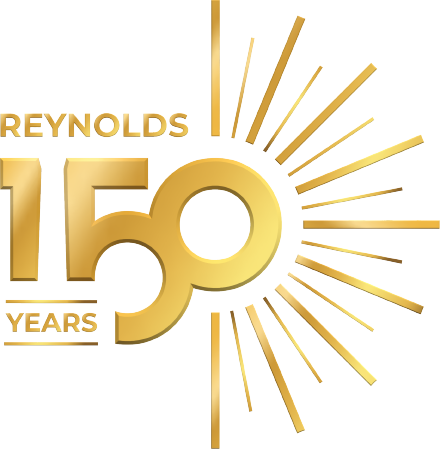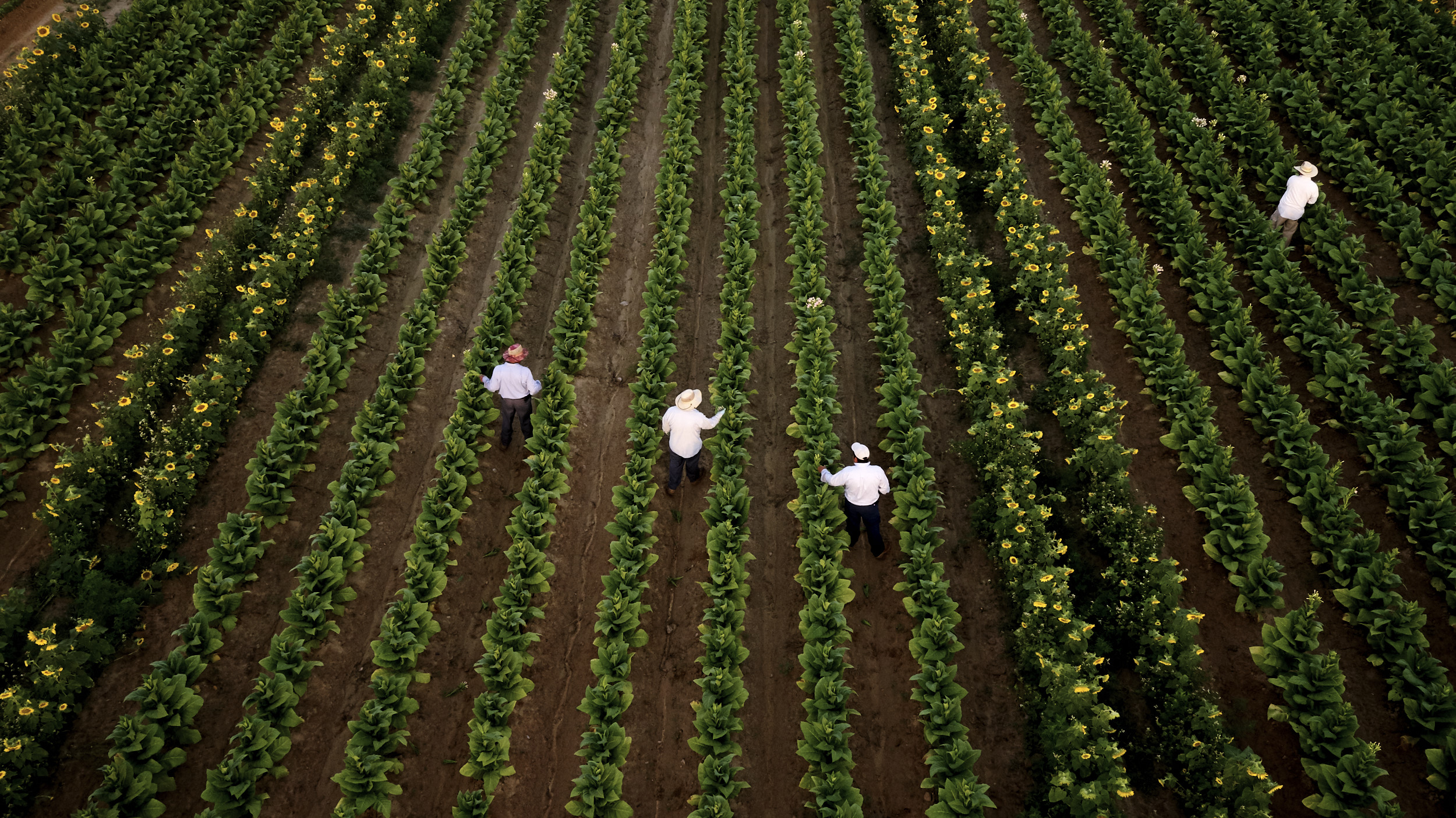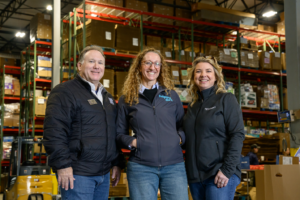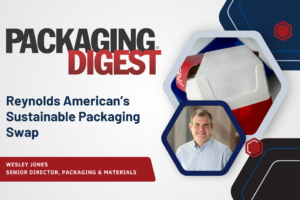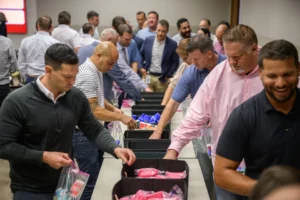Sustainable Farming
The Reynolds American organization’s approach to agriculture and working with farmers is designed to mitigate and reduce environmental impacts. We continue to develop, advance, and implement tools and initiatives that preserve our natural resources and environments, enhance rural livelihoods, and increase resilience to climate change.
We’ve adopted the global BAT Group Biodiversity Operational Standard to our direct leaf operations as well as providing guidance to third party leaf suppliers by outlining policies under which we aim to protect biodiversity and explaining how to adhere to the principles of sustainable development, covering agricultural, manufacturing, and distribution operations. It is largely focused on avoiding, minimizing, and mitigating our impact on ecosystems. This standard applies to our use of wood as fuel for tobacco curing, new farmland development by tobacco farmers and leaf suppliers, and tobacco farming and its associated agricultural practices.
Our approach to agriculture and working with farmers is designed to mitigate and reduce environmental impacts. While the industry-wide Sustainable Tobacco Programme (STP) helps to maintain high environmental, social and agronomy standards in our tobacco leaf supply chain on a day-to-day basis, many of the challenges impacting upon the livelihoods of farmers and sustainability of agriculture require a long-term, holistic approach.
Good Agricultural Practices
Many of the challenges impacting the livelihoods of our farmers and sustainability of agriculture are aided by additional certifications. The Good Agricultural Practices (GAP) Connections farmer certification program helps produce quality crops while protecting, sustaining, or enhancing the environment; ensuring the safety and rights of farm laborers; and recognizing producers committed to a higher standard.
Preserving Natural Resources
Through our operations and use of ecosystems services such as forest products, soil, and water, we directly impact those ecosystems and communities and must continually work to manage our impact.
At the Reynolds American organization, we’ve adopted the global BAT Group’s Biodiversity Risk Assessment to our direct leaf operations and are providing guidance to third party leaf suppliers by outlining policies under which we aim to protect biodiversity and explaining how to adhere to the principles of sustainable development covering agricultural, manufacturing, and distribution operations.
We are largely focused on avoiding, minimizing, and mitigating our impact on ecosystems. This standard applies to our use of wood as fuel for tobacco curing, new farmland development by tobacco farmers and leaf suppliers, and tobacco farming and its associated agricultural practices.
Sourcing Sustainable Wood
Our goal is to eliminate the use of unsustainable wood sources by our contracted farmers.
Our afforestation programs encourage tree planting to provide a sustainable source of wood for farmers who require it for tobacco curing. The global BAT Group also wants to eliminate any potential risk of forests being cleared to create farmland to grow tobacco. Aligned to the global BAT Group, the Reynolds American organization participates in the Sustainable Tobacco Programme. This requires that before any expansion of farming on new land, all contracted farmers conduct a detailed environmental and regulatory evaluation. This process should factor in local legislation and the presence of rare or endangered species.
We are also encouraging some of our contracted farmers to cure their tobacco with appropriate, locally available alternative fuels. All fuels have environmental impacts, so we are also evaluating ways to minimize fuel consumption, for example by using innovative designs for curing barns.
Soil Conservation
Our approach to soil conservation and improvement involves testing and adapting available technology for each area to help reach the best solutions, depending on local soil conditions, climate and topography.
There are various ways to improve soil fertility and create the best growing conditions, while avoiding soil loss or deterioration. The techniques the Reynolds American organization promotes include minimum tillage, a method that minimizes turning or disruption of the soil; relay cropping, where two or more crops are grown in sequence; and the use of plant-based green manure.
The farmers we work with already have highly diversified farms, with 100% of our U.S. growers growing other crops alongside, or in rotation with, tobacco. We’ve always encouraged this crop diversification – it not only increases farmers’ resilience by not relying on just one crop but also helps to enhance food security and to preserve soil health.
We are also introducing farmers to techniques such as contour planting, which lessens the effect of water run-off and requires less tilling. Our expert field technicians provide farmers with technical assistance on areas such as sustainable soil, water, biodiversity, forest, and pest management. The benefits of this can be seen in agrochemical usage, which is generally significantly lower in tobacco growing than other comparable crops.
Organic Farming
In 2023, we had 46 organic contract growers, sourcing from over 1,300 acres of organic farmland.
Santa Fe Natural Tobacco Company, an operating subsidiary of the Reynolds American organization, has sourced organically grown tobacco since before the national organic certification standards were established by the USDA in 2002. Its contracted organic growers are inspected and recertified annually and rotate crops with other organic produce to support business year over year.
Organic farming offers several benefits that contribute to a better environment. This can include reduced pollution as organic farming practices minimize the use of synthetic pesticides and fertilizers, which helps reduce water and soil pollution. It can also reduce water requirements, promote healthy soil, and support biodiversity. Organic farms tend to support diverse ecosystems, including beneficial insects, birds, and soil organisms.
Conclusion
Our business depends on and impacts biodiversity at a local and national level. Through our operation companies and their use of ecosystems services such as forest products, soil, and water, we directly impact those ecosystems and communities and must continually work to manage our impact.
Footnotes:
Reynolds American Inc. (RAI) is a wholly owned U.S. subsidiary of the global BAT Group and the U.S. parent company of, among others, R. J. Reynolds Tobacco Company; Santa Fe Natural Tobacco Company, Inc.; American Snuff Company, LLC; R. J. Reynolds Vapor Company; Modoral Brands Inc.; RAI Services Company; and Reynolds Marketing Services Company. References to “Reynolds,” “Reynolds American,” “we,” “us,” “our”, and “organization” are for convenience and collectively refer to RAI and/or RAI’s independent operating subsidiary companies.
Forward-looking Statements
This document may contain certain forward-looking statements, including “forward-looking” statements made within the meaning of the U.S. Private Securities Litigation Reform Act of 1995. These statements are often, but not always, made through the use of words or phrases such as “believe”, “anticipate”, “could”, “may”, “would”, “should”, “intend”, “plan”, “potential”, “predict”, “will”, “expect”, “estimate”, “project”, “positioned”, “strategy”, “outlook”, “target” and similar expressions. These include statements regarding our ESG targets.
All such forward-looking statements involve estimates and assumptions that are subject to risks, uncertainties and other factors. It is believed that the expectations reflected in this document are reasonable, but they may be affected by a wide range of variables that could cause actual results and performance to differ materially from those currently anticipated. A review of the reasons why actual results and developments may differ materially from the expectations disclosed or implied within forward-looking statements can be found by referring to the information contained under the headings “Cautionary Statement” and “Group Principal Risks” in the 2023 Annual Report and Form 20-F of British American Tobacco p.l.c. (BAT).
Additional information concerning these and other factors can be found in BAT’s filings with the U.S. Securities and Exchange Commission (“SEC”), including the Annual Report on Form 20-F and Current Reports on Form 6-K, which may be obtained free of charge at the SEC’s website, https://www.sec.gov/ and BAT’s Annual Reports, which may be obtained free of charge from the BAT website https://www.bat.com/.
The forward-looking statements reflect knowledge and information available at the date of preparation of this website and we undertake no obligation to update or revise these forward-looking statements, whether as a result of new information, future events or otherwise. Readers are cautioned not to place undue reliance on such forward-looking statements.
